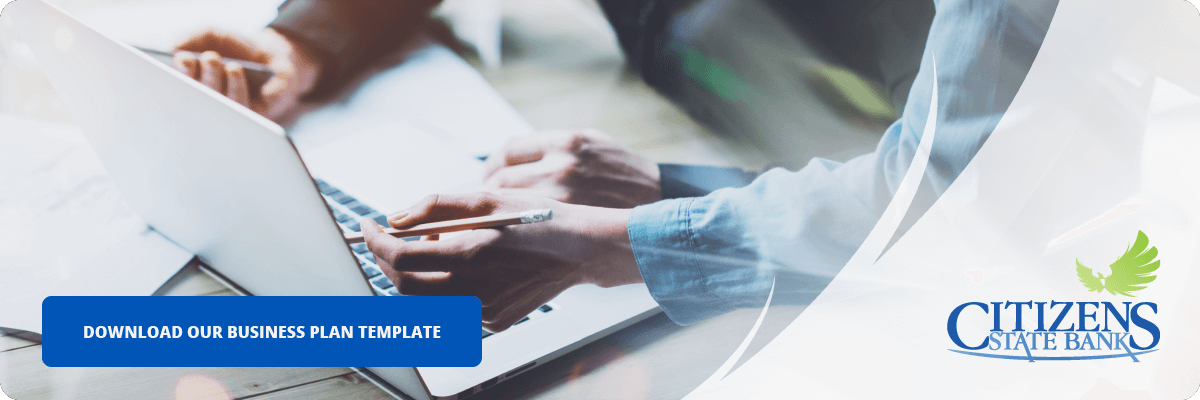
Applying for small business loans can be intimidating, but the more preparation you do, the higher your odds are of getting your application approved. If you’re wondering how to get a business loan from a bank, here are the steps we recommend.
Create or Revisit Your Business Plan
It may sound cliche, but prudent business owners operate with clarity in relation to big business decisions—and taking out a loan fits this category.
Creating or revisiting your business plan is a helpful first step. It’s important to establish metrics and benchmarks for success in accordance with your long-term priorities. Inside our free template, we even include a section specific to financial planning because it’s essential to first determine if and how a small business loan will benefit your company.
Whether or not you end up applying for a loan, creating a routine of evaluating your priorities and writing them down is a helpful practice we highly recommend. And if you do apply for a business loan, lenders will likely request a copy.
Determine Why You Need a Small Business Loan
Is it to handle daily expenses? Ensure a safety cushion? To start or grow your business? Preparing your financial statements and recording your business plan help unearth the root cause of your need.
For instance, if your digging reveals inconsistent cash flow, the remedy might be an entirely different answer than taking out a small business loan. Put simply, the best small business loans help you capitalize on opportunities that can grow your business, not artificially support them.
That’s why our team of small business loan experts spends time learning about your specific business banking needs and goals before making any recommendations.
Also at this stage, many business owners find immense value in consulting with mentors and coaches, other business leader peers, and even referring to online reviews and forums. This is an important and strategic decision that deserve
Review Your Credit History
If your business is less than three years old, your personal credit history will likely play a large part in getting a business loan from a bank.
Some lenders only accept credit scores above a certain threshold, so you’ll want to collect those numbers before going further in an application process. Request a free copy of your credit report and address any potential problems before applying.
Building good personal credit requires paying your bills on time and in full. You also want to keep your credit utilization under 30% at the very least–10% is even better. Additionally, keep credit accounts open, even old ones you don’t use regularly. Credit history takes account age into consideration when determining your credit score. However, don’t apply for too many lines of credit at once—every six months for a credit application might be an appropriate benchmark.
You’ll also need to establish and build good business credit to get a business loan. To start, you need to register your business with all appropriate federal, state, and local government bodies. Once you do this, you can apply for a federal tax identification number and start building credit on behalf of your business. Secondly, you must keep your credit score current with the three main credit bureaus: Dun & Bradstreet, Experian, and Equifax.
Since you don’t know which one prospective lenders will use, make sure your info is current with all three. Additionally, it’s important to establish trade lines with vendors to build your credibility as a borrower. Be sure to ask your vendors to report your payments to the credit bureau, so they are kept apprised of your on-time payments. Here are five simple steps to build business credit quickly.
Understand the Small Business Loan Types Available to You
Like any significant business decision, there are numerous options here. It’s important to understand the pros and cons of each so you can determine which small business loan type is best for your Central Indiana business.
Line of Credit
This short-term loan provides you with a certain amount to withdraw. You only pay back and pay interest on the amounts you take.The key here is a line of credit provides access to funding quickly while also building your credit score. Plus, this approach typically offers you greater flexibility and affordability in that you can utilize the capital for your most pressing needs at competitive rates.
Term Loan
Borrowers receive a lump sum and make monthly repayments of both principal and interest. These loans typically charge lower interest rates when collateral is used to guarantee the loan.
Specialty Financing
Specialty financing usually comes into play when leasing or buying equipment from your friendly neighborhood banker. The equipment itself is collateral, and you pay back the loan over its lifespan. You can also take out a commercial real estate loan with special financing.
Invoice Financing
Also known as Factoring, a business can use unpaid invoices or accounts receivables as collateral to receive an advance up to a certain percentage of the invoice’s value from a third party lender. Once the invoice or receivable is paid, the business will repay the third party lender plus related fees. For businesses that may not qualify for a traditional bank loan, factoring can help a business meet its immediate cash flow needs. This is a form of asset-based lending, and while the liquidity benefit is immediate the costs of factoring can be significant and should be considered
Merchant Cash Advance
Arguably the easiest type of loan, borrowers receive a cash advance in exchange for a percentage of their business’s future credit card sales. These loans are short, repayment is taken out daily, and their interest rates are extremely high–up to 200 percent.
Unsecured vs. Secured Loans
A secured loan requires some kind of collateral. Should you default on the loan, your lender will claim these assets. An unsecured loan does not require collateral, but the interest rates are typically higher because the lender is taking on a greater risk.
Small Business Administration-Backed Loan
A SBA-backed loan means that the small business administration guarantees a part of your loan so if you default, they, not you, will pay the lender. Since these business loans are less risky for lenders, they're usually easier to get approved. SBA-guaranteed loans typically have long borrowing terms, low-interest rates, and high borrowing amounts. In general, they require lower down payments and no collateral.
Choose a Lender and Schedule an Appointment
This is an important decision because your lender can be a financial partner who steers you in the right direction or one who takes a “hands-off” approach. A community bank like Citizens State Bank is a good choice for small businesses because we have more flexibility to help you achieve your financial goals.
Prepare Your Documentation and Prepare to Apply Presentation
Regardless of the small business loan type you request, there is specific documentation you will need to provide. Examples include tax returns, financial statements, business legal documents, your business plan, and bank statements.
It’s also important to prepare a summary of why you’re applying for the loan and your repayment plans.
Use Your Best Judgment and Stay Safe
In addition to the steps outlined above, it’s important to protect yourself from predatory lenders by watching out for these warning signs.
Interest rates that are significantly higher than competitors' rates
Fees that are 5%+ of the loan value
Lender doesn't disclose the annual percentage rate
Lender doesn't disclose a full payment schedule
A lender should never ask you to lie on paperwork
A lender should never ask you to leave a signature box blank
The bottom line is: don’t feel pressured into taking a small business loan. Trust your instincts. If something seems fishy or out of place to you, it probably is. Don’t let predatory lenders force you into something you feel uncomfortable with. Part of avoiding predatory lending practices is working with the best Central Indiana bank for your business loan. We can help you find a loan that will give you the best option for your business.
Citizens State Bank—a Trusted Partner for Your Business Loan
These steps will help you prepare to apply for your commercial loan. You can always contact a Citizens State Bank Relationship Manager when questions arise or visit our additional resources related to finances for small businesses.
Running a business is a journey filled with unanticipated obstacles and tough decisions. That’s why you need a banking partner you can trust by your side. Citizens State Bank is one of the best for small business startup loans. We work with you to understand your goals, needs, and pain points so that you have a financial planning solution that is as unique as your business.
My Business Plan
There are many ways to create a winning business plan. The best plans are customized to meet your needs. This blueprint will help you identify those key areas and objectives that require focus and clarity to launch or grow your business.
The views, information, or opinions expressed in this article are solely those of the author and do not necessarily represent the views of Citizens State Bank and its affiliates, and Citizens State Bank is not responsible for and does not verify the accuracy of any information contained in this article or items hyperlinked within. This is for informational purposes and is no way intended to provide legal advice.

